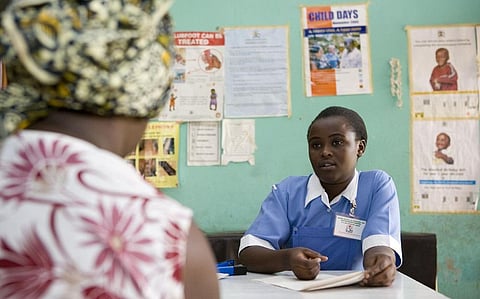

Health ministers of African countries launched a campaign August 23, 2022, to ramp up awareness and bolster prevention and care to curb the toll of sickle cell disease.
The campaign was launched at the 72nd session of the World Health Organization (WHO) Regional Committee for Africa in Lome, Togo.
Sickle cell disease is one of the region’s most common illnesses and receives inadequate attention.
More than 66 per cent of the 120 million people affected worldwide by sickle cell disease live in Africa, according to WHO.
Countries in Africa’s eastern and western regions, including Nigeria, Democratic Republic of the Congo, Ghana, Tanzania, Uganda and Kenya, have recorded the highest disease burden. Nigeria is the global hotspot of sickle cell disease.
Approximately 1,000 children are born with the disease every day in Africa, making it the most prevalent genetically-acquired disease in the region.
More than 50 per cent of these children die before their fifth birthday, usually succumbing to infection or severe anaemia.
Sickle cell disease is hereditary and shortens the lifespan of red blood cells, causing sickle cell anaemia.
Poor blood oxygen levels and blood vessel blockages in people with sickle cell disease can cause extreme pain in the back, chest, hands and feet. It can also cause severe bacterial infections.
The diseases also pose considerable economic and social costs for those affected and their families. It interferes with many aspects of a patient’s life, including education, employment, mental and social well-being and development.
The total annual cost of treatment and impact on the economy across sub-Saharan Africa for the year 2020 was $9.1 billion.
This is further expected to rise to $10.2 billion by 2030, according to a recent analysis.
Africa recorded a 26 per cent increase in deaths from sickle cell disease between 2000 and 2019, according to the WHO. Some 38,403 people succumbed to the disease in 2019 alone.
Poor investment in efforts to control the disease is among the key reasons for the rising burden of mortality rates.
Public health facilities are not equipped to provide enough services for prevention, early detection and care for sickle cell disease.
Newborn screening has a large role in the fight against sickle-cell disease, according to the Consortium on Newborn Screening in Africa.
But, the lack of accurate and reliable data on the disease due to the absence of newborn screening programmes and surveillance is a challenge that demands attention, said WHO in a statement during the campaign’s launch.
The data collection on sickle cell disease is excluded from most population surveys. Data deficit and gaps indicate “low priority” given to the disease.
The shortage of health care personnel and services at lower-level health facilities has also hampered effective response to the disease.
Ensuring financial resources for sickle cell disease prevention and control across the continent is one of the critical purposes of the campaign.
“Most African countries do not have the necessary resources to provide comprehensive care for people with sickle cell disease despite the availability of cost-effective interventions,” said Dr Matshidiso Moeti, WHO regional director for Africa.
We need to spotlight this disease and help improve the quality of life of those living with it, he added.
The campaign also seeks to raise public awareness of the disease in schools, communities, health institutions and media. It advocates for stronger health systems to ensure quality and uninterrupted services and equitable access to medicines and innovative tools.
Increasing awareness and early interventions in high-income countries have led to considerable reductions in mortality among children under five years, noted a Lancet study.
The campaign led by the WHO is supported by partners including — the World Bank, the United States department of human and health services, Global Blood Therapeutics and Sickle in Africa
The campaign underscores enhanced investment and more robust collaboration to control Africa’s rising burden of sickle cell disease.